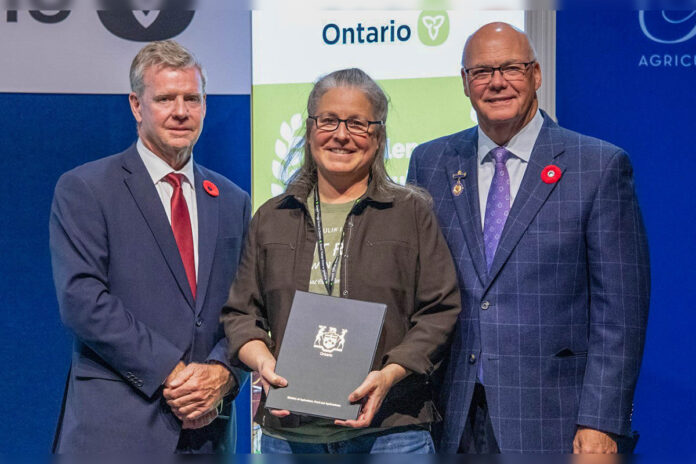KAGAWONG—Currently, Manitoulin municipalities spend approximately $2.3 million a year to ship their waste off-Island but by working together to deal with all waste on the Island, municipalities could see at least a 10 percent annual decrease in spending costs.
“You will all receive a letter to present to your councils that will show how your municipality/township can save 10 percent by joining our proposal, hiring a coordinator to facilitate this and save municipalities 10 percent per year,” said Vince Grogan of the Island Wide Waste Resource Committee (IWWRC) at a meeting with several Island municipal/township clerks and CAO’s last week. He said using Gore Bay as an example: they spend roughly $370,000 per year to get rid of and ship waste off the island. He said the whole idea is to turn waste into revenue, assessments and local employment. Billings spends roughly $125,000-$130,000 per year in waste compacting and burying waste in its landfill. The latter recycles corrugated materials and also makes money off steel and electronic products, for example. “With the ‘Kagawong mall,’ where old items are repurposed, an old table lamp can be brought by someone to the dump and an hour later someone has taken the item home to use.” He said all plastics could be shredded and products such as tin cans and corrugated items could all become sellable products.
“There will be letters sent on behalf of our committee to all mayors, CAOs and councils on our proposal,” said Mr. Grogan. “We are hoping to open up communication. We hope every community will join in as well. How much money can we save by working together? I say 20 percent but the committee says it would be 10 percent.”
“I feel 20 percent is too high,” said Bill Orford, a member of the committee.
“We are done trying to move this forward by focusing on how waste reduction will help the environment by working together,” said Mr. Grogan. “We are hoping to open up communication, and hope every community join in as well, after looking at how much money can be saved.
“We have to be serious about waste, and ways of looking at reducing it,” said Colen McKeever, a member of the committee. “It is really important to get education out to taxpayers that we are going to save money by dealing with waste ourselves.”
“It would be crazy to not work together if we can reduce waste turn it into a resource, and into revenues,” said Karen Noble, secretary of the Robinson Township local services board (LSB).
Mr. McKeever said, “everyone is looking at waste management as a problem. But we need to look at this as an opportunity. There is so much opportunity to manage our waste and reduce it, and there is funding out there of up to 80 percent for different programs looking at reducing, recycling, reusing.”
“At the end of all of this, we want to process as much waste as we can on Island,” said Mr. Orford.
In the letter being sent to municipalities/townships from Mr. Grogan on behalf of the IWWRC explains, “combining our efforts will make the overall solution benefit more of our population and bring general costs down. We anticipate reducing shipping costs off the island, creating more local jobs for the economy and also finding a more sustainable solution for long-term waste disposal. We anticipate costs of approximately $5 per citizen with member communities, which would be required for the 2025 and 2026 financial years. After that we anticipate cost savings of more than 10 percent of current waste costs, which would be more than adequate to maintain the employee and keep the process moving forward. So, for a small investment over the next two years, we anticipate creating an overall cost savings for the long term.”
Even if Central Manitoulin and the Western Manitoulin municipalities participated, they would be able to get 80 percent of the trucks hauling waste reduced on the Island.
“Our single focus is the education part. If we can get the masses to buy in to our vision, we will see savings and reduce waste,” said Mr. Grogan. “We have several solutions that we would collectively look at that we would lay out, once we get everyone on board.”
Currently, with off-Island trucks from GFL removing waste from communities on-Island, “from the time they leave the Island we have no control mechanisms. We don’t even know if the trucks are leaving full,” said Mr. Grogan.
Mr. Grogan said in a way to reduce costs Robinson township had negotiated with GFL to keep waste removal costs (which the company had originally proposed to increase substantially in 2025) the same for the next, and possibly subsequent years.
The town of Gore Bay just took the increase proposed by GFL, said Harry Schlange, Gore Bay town manager.
“If we were a business, I would say that the rest of us (municipalities) missed out on an opportunity to negotiate together, and get the same option. We can learn from that,” said Mr. Grogan.
“We have common sense solutions, all we need is to get the Island support,” said Mr. Grogan.
In the letter to the municipalities it is stated, waste is a growing problem everywhere. “Several municipalities are already being forced to ship their waste off-Island, collectively costing us approximately $2.3 million. Billings is fortunate to still have a functioning landfill but it is approaching its capacity limit and council is aware that it will not last forever and is looking for ways to move towards a circular economy where what we currently waste can recycled, re-used in a model of product and consumption, which involves sharing, leasing, reusing, repairing, refurbishing and recycling existing materials as long as possible. We acknowledge it will not last forever and the environmental challenge of dealing with waste is something that needs attention sooner rather than later.”
The IWWRC’s (which was formed among citizens across the Island in 2023) philosophy is to “cover the basics of reducing waste production and turning the rest of the waste into a resource for the communities, while simultaneously reducing costs for everyone. The greener option for the environment can also present cost savings for us.”
“Our goal is to gather many of the local communities together to follow this rough plan—2024: pool resources, apply for a grant to hire an employee; 2025: hire the employee. They will work to research various waste disposal options that can function locally and identify streamlining options in our current systems; 2026: present waste processing options to member groups and begin the process of further grant proposals for the chosen path forward. And in 2027: begin implementation of improved waste processing systems. Hiring an employee for these challenges will facilitate a focused effort in this direction without placing more burden on current municipal employees. Billings township has committed to supervising this employee and shouldering the human resources burden,” the letter continues.
“There are many reasons to put more focus on innovative ways to deal with waste. We hope cost savings will be a strong motivation for our citizens and councils, and creating a local solution to a growing problem is also beneficial to all. We should not be totally reliant on shipping waste off-Island to Espanola, because if the current contractor, should, for example, lose their license our alternative would be far more distant and expensive,” the letter says. “To summarize, we are seeking a commitment of $5 per resident to ensure the development of the project in 2025. We hope you consider joining this project to keep Manitoulin Island, Mnidoo Mnising, as beautiful as it is today for future generations.”





